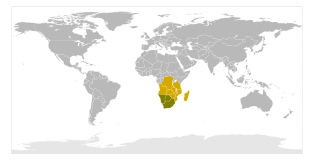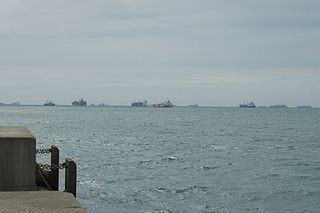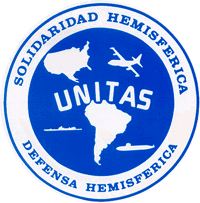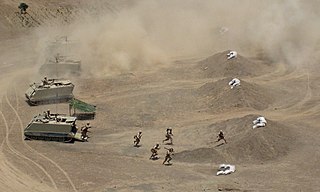
The Reagan Doctrine was stated by Reagan in his State of the Union message on February 6, 1985: "We must not break faith with those who are risking their lives--on every continent from Afghanistan to Nicaragua--to defy Soviet-supported aggression and secure rights which have been ours from birth." It was a strategy implemented by the Reagan Administration to overwhelm the global influence of the Soviet Union in the late Cold War. The doctrine was a centerpiece of United States foreign policy from the early 1980s until the end of the Cold War in 1991.

USS Tang (SS/AGSS-563), the lead ship of her class was the second ship of the United States Navy to be named for the tang.

USS Moosbrugger (DD-980) was a Spruance-class destroyer built for the United States Navy by the Ingalls Shipbuilding Division of Litton Industries at Pascagoula, Mississippi. Affectionately nicknamed the "Moose" by her crews, she was named in honor of Vice Admiral Frederick Moosbrugger who is best known for his service in World War II as a highly successful commander of destroyer squadrons.

USS Hammerberg (DE-1015), a Dealey-class destroyer escort, was a ship of the United States Navy named for Navy diver Francis P. Hammerberg (1920–1945), of Flint, Michigan, who was awarded the Medal of Honor posthumously for rescuing two fellow divers from a wreck in Pearl Harbor.

USS Courtney (DE-1021) was a Dealey-class destroyer escort of the United States Navy, in service from 1956 to 1973.

The Angolan Civil War was a civil conflict in Angola, beginning in 1975 and continuing, with interludes, until 2002. The war began immediately after Angola became independent from Portugal in November 1975. The war was a power struggle between two former liberation movements, the People's Movement for the Liberation of Angola (MPLA) and the National Union for the Total Independence of Angola (UNITA). The war was used as a surrogate battleground for the Cold War by rival states such as the Soviet Union, Cuba, South Africa and the United States.

Operation Savannah was the South African Defence Force's 1975–1976 covert intervention in the Angolan War of Independence, and the subsequent Angolan Civil War.

USS John Willis (DE-1027) was a Dealey-class destroyer escort in the United States Navy in service from 1957 to 1972.

USS Vreeland (FF-1068) was a Knox-class frigate of the United States Navy. The ship was named for Rear Admiral Charles E. Vreeland (1852–1916).

Angola – United States relations are diplomatic relations between the Republic of Angola and the United States of America. These relations were tense during the Angolan Civil War when the U.S. government backed National Union for the Total Independence of Angola (UNITA) rebels, but have warmed since the Angolan government renounced Communism in 1992.
The Agreement among the People's Republic of Angola, the Republic of Cuba, and the Republic of South Africa granted independence to Namibia from South Africa and ended the direct involvement of foreign troops in the Angolan Civil War. The accords were signed on 22 December 1988 at the United Nations Headquarters in New York City by the Foreign Ministers of People's Republic of Angola, Republic of Cuba and Republic of South Africa.

Angola–South Africa relations refer to the current and historical relationship between Angola and South Africa. Relations in the post-apartheid era are quite strong as the ruling parties in both states, the African National Congress in South Africa and the MPLA in Angola, fought together during the Angolan Civil War and South African Border War. They fought against UNITA rebels, based in Angola, and the apartheid-era government in South Africa which supported them. Nelson Mandela mediated between the MPLA and UNITA during the final years of the Angolan Civil War. Although South Africa was preponderant in terms of relative capabilities during the late twentieth century, the recent growth of Angola has led to a more balanced relation.

U.S. Naval Forces Southern Command is the naval element of United States Southern Command (USSOUTHCOM). Its areas of operation include South America, Central America, the Caribbean and surrounding waters. Its headquarters are located at Naval Station Mayport, Florida. USNAVSO is currently under the command of Rear Admiral Sean S. Buck.
This article deals with the activities of the U.S. Central Intelligence Agency (CIA) in Angola. The list of activities may be incomplete due to the clandestine nature of the subject matter.

United Nations Security Council resolution 1295, adopted unanimously on 18 April 2000, after reaffirming Resolution 864 (1993) and all subsequent resolutions on Angola, particularly resolutions 1127 (1997), 1173 (1998) and 1237 (1999), the Council authorised a tightening of sanctions against UNITA and established a panel of experts to investigation violations of Security Council resolutions imposing measures against UNITA.

United Nations Security Council resolution 945, adopted unanimously on 29 September 1994, after reaffirming Resolution 696 (1991) and all subsequent resolutions on Angola, the Council extended the mandate of the United Nations Angola Verification Mission II until 31 October 1994 and discussed the implementation of peace agreements.

United Nations Security Council resolution 1045, adopted unanimously on 8 February 1996, after reaffirming Resolution 696 (1991) and all subsequent resolutions on Angola, the Council discussed the implementation of the Lusaka Protocol, and extended the mandate of the United Nations Angola Verification Mission III until 8 May 1996.

United Nations Security Council resolution 1135, adopted unanimously on 29 October 1997, after reaffirming Resolution 696 (1991) and all subsequent resolutions on Angola, the Council extended the mandate of the United Nations Observer Mission in Angola (MONUA) until 30 January 1998 and urged UNITA to comply with previous resolutions, particularly as sanctions were due to come into effect.



















